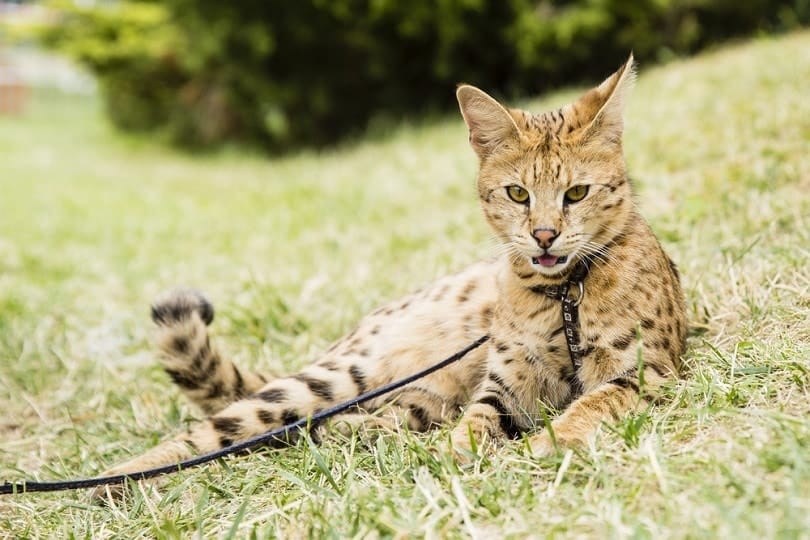Since Savannah cats are a hybrid cat breed with wild Serval ancestry, there can be some legalities involved with owning the breed. Savannah cats are legal in a lot of places, but they are also deemed exotic and banned in others. The legality of owning a Savannah cat can vary state by state or even by county or municipality.
Savannah cats are even categorized by generation, and the generation can play a role in legal ownership as well. It is so very important to know your state and local laws regarding the ownership of both hybrid and exotic animals before ever bringing one home.
Savannah Cat by Generation
Savannah Cats are categorized by filial generation, or how many generations they are removed from the Serval. You will notice Savannah cats labeled per filial generation, F1 through F8. F1 is closest generationally with the Serval, and F8 being the furthest.
Legal ownership can very well be dependent on filial generation. Some states will only allow certain filial generations for legal ownership, typically F4-F8. You will see below our table that goes over the legalities by state.
The Importance of Legal Ownership
Laws surrounding the ownership of exotic and hybrid animals not only vary by state, county, or municipality, but they are subject to change at any time.
Any person who is interested in ownership of an animal that fits into the category of hybrid or exotic, needs to be aware of their local laws and fully prepared to adjust if the law were to change. Here are some things to consider before bringing home a Savannah cat:
Find a Reputable Breeder – When searching for a Savannah cat, make sure you research and get in contact with a respected Savannah breeder. Reputable breeders will care about where their kittens go and will ensure they are being sent to a home where ownership is legal. They will also be able to advise you on the precise filial generation.
Generation Legality – When you are looking into the local laws, make sure you compare any legalities related to the filial generation of the Savannah cat. If you are in an area that only allows F4-F8, you must follow the law.
Permits – There are certain cities, counties, and even states that will require you to obtain a permit to own a Savannah cat. Check with your local government about the law and the way you can obtain any needed permits if they are required.
Crossing State Lines – Even if you live in an area that allows all generations of Savannah cats, you could be in for some trouble if you were caught transporting the cat across state lines. Even if you are just traveling with your pet, you can get in some legal trouble for bringing an animal deemed exotic across state lines. Before traveling with your Savannah, look up the laws in the cities and states you’ll be visiting.
Consequences of Illegal Ownership – There can be serious consequences if you were to be caught illegally housing a Savannah cat or any other exotic animal. In some cases, the animal will be confiscated and potentially euthanized. At the very least, you will be subject to serious fines.

Savannah Ownership by State (Current Legalities)
As noted above, the laws regarding the ownership of exotic and hybrid animals, including the Savannah cat are subject to change. Here’s a reference to the current legalities surrounding ownership of the Savannah cat by state:
| State | Legal Savannah Cat Ownership by Categorized Generation |
| Alabama | All generations legal |
| Alaska | F4 -F8 legal |
| Arizona | All generations legal |
| Arkansas | All generations legal |
| California | All generations legal |
| Colorado | F4-F8 (Illegal within Denver city limits) |
| Connecticut | All generations legal |
| Delaware | Permit required |
| Florida | All generations legal |
| Georgia | Illegal statewide |
| Hawaii | Illegal statewide |
| Idaho | All generations legal |
| Illinois | All generations legal |
| Indiana | All generations legal (permit may be required in certain counties) |
| Iowa | F4-F8 legal |
| Kansas | All generations legal |
| Kentucky | All generations legal |
| Louisiana | All generations legal |
| Maine | All generations legal |
| Maryland | All generations legal (Must weigh under 30 pounds) |
| Massachusetts | F4-F8 legal |
| Michigan | All generations legal |
| Minnesota | All generations legal |
| Mississippi | All generations legal |
| Missouri | All generations legal |
| Montana | All generations legal |
| Nebraska | Illegal statewide |
| Nevada | All generations legal |
| New Hampshire | F4-F8 legal |
| New Jersey | All generations legal |
| New Mexico | All generations are legal (Some cities may require a permit) |
| New York | F5-F8 legal (Illegal in New York City proper) |
| North Carolina | All generations legal |
| North Dakota | All generations legal |
| Ohio | All generations legal |
| Oklahoma | All generations legal |
| Oregon | All generations legal (Permit may be required in certain cities/counties) |
| Pennsylvania | All generations legal |
| Rhode Island | Illegal statewide |
| South Carolina | All generations legal |
| South Dakota | All generations legal |
| Tennessee | All generations legal |
| Texas | Illegal in most counties (must check with county government) |
| Utah | All generations legal |
| Vermont | F4-F8 legal |
| Virginia | All generations legal |
| Washington | All generations legal (banned in Seattle city limits |
| Washington D.C. | All generations legal |
| West Virginia | All generations legal |
| Wisconsin | All generations legal |
| Wyoming | All generations legal |
Conclusion
The legality of Savannah cat ownership does vary state by state and even by county or municipality. Some states may allow all generations of Savannah, while certain counties or cities within that state have the right to ban them entirely. It’s important to check with your state and local laws before bringing home a Savannah cat.
Featured Image Credit: Shutterstock














